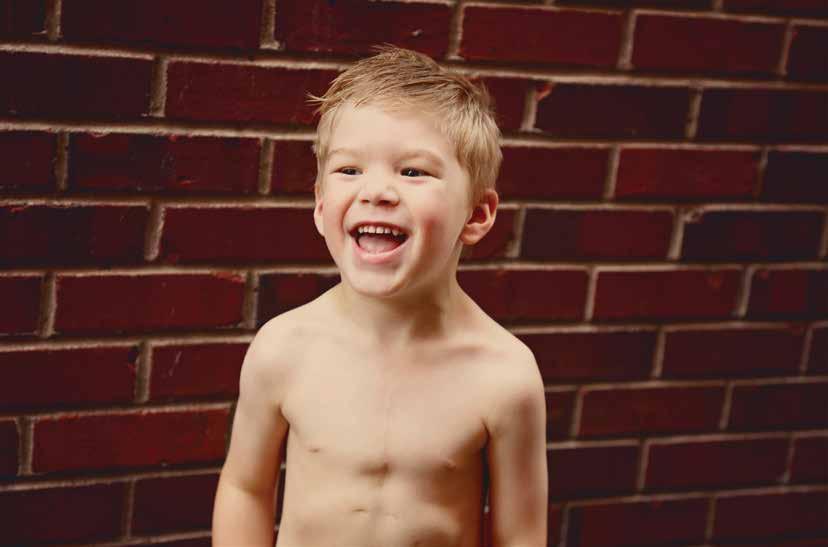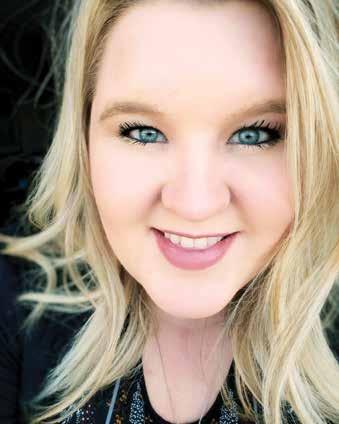
4 minute read
From medical crisis to meaningful mission
By Andrea Busche
According to Jessica Chenevert, marketing director for Conquering CHD, 1 in every 100 babies is born with the medical condition known as congenital heart disease.
“CHD is the most common birth defect affecting babies born today,” she said.

Within that shocking statistic several permutations exist.
“There are actually about 40 different heart defects possible,” Chenevert said.
According to the Conquering CHD website, nearly 40,000 babies will be born with CHD in the United States this year alone. Estimates suggest that there are nearly 1.5 million adults living with CHD today.
For Chenevert, her career — which is centered around helping other families dealing with CHD — was launched out of a very frightening time in her own personal life. Her son, Barrett, was born with CHD and had a total of three heart defects. Through learning about Barrett’s condition, along with volunteering and advocating for the cause, Chenevert eventually turned a personal mission of helping her son into a deeply meaningful career.
Medical background
Chenevert is originally from the small North Shore community of Lutsen, Minnesota. Her great-great-great grandfather, C.A.A. Nelson, was the original founder of Lutsen ski hill and resort, and her family retains deep ties to the community.
After graduating from Cook County High School, Chenevert pursued a career in the medical field. She earned an associate’s degree in medical billing and coding, and later became a certified nursing assistant and then a trained medical assistant.
“I have always loved the medical side of things,” she said. “I’m just drawn to it. It was a fortuitous decision for me to pursue a medical career, but I just didn’t know it at the time.”
Chenevert also worked in education for a while. She was a paraprofessional at Birch Grove Community School in Tofte, which is where she met her husband, Nolan Chenevert — a second and third grade teacher. They married in 2013.
Barrett’s arrival
When the Cheneverts were expecting their son, everything looked great.
“I had a normal, healthy pregnancy, and my ultrasounds showed that everything was fine,” Chenevert said.
However, at just 20 hours old, baby Barrett developed cyanosis — a condition where the skin turns blue due to lack of oxygen. His pulse also dropped into the 30s. The decision was made to airlift the tiny infant to Children’s Minnesota, and his distraught parents were forced to stay behind — later driving to the Twin Cities to be with their son.
“We said goodbye to him, and it was so emotional,” Chenevert shared. “We weren’t sure if we’d see him again.”
Upon arrival, Barrett immediately underwent a heart catheterization procedure. At just 56 hours old, he had his first open-heart surgery — an arterial switch operation — to correct the transposition of his great arteries. A septal defect (hole in the heart) was also discovered and corrected/closed at that time. And, at 13 days old, Barrett had another surgery to repair a coarctation of his aorta.
After a very frightening 17 days, Barrett was doing well, and the family was sent home from the hospital.
“We had medications to deal with, and lots of medical appointments,” Chenevert said. “But there wasn’t a lot of extra care required other than the suggestion that we ‘try not to let him cry too hard,’ which is tough with an infant.”
While Jessica and Nolan were incredibly grateful for their son’s recovery, it was tough to absorb the fact that Barrett’s heart condition would be for life.
“Thankfully, defects can be repaired, but Barrett will live with CHD forever,” Chenevert said.
Looking for support
While she was home caring for Barrett, Chenevert wondered what forms of support existed for families dealing with CHD. She stumbled upon the Pediatric Congenital Heart Association (now known as Conquering CHD).

“I really connected with the information and content they had,” she shared. “First, I followed them on social media, and I was eventually offered the opportunity to travel to Washington D.C. to share my story with Congress. I loved the idea of it being more than just helping my kid — I could make a difference on a bigger scale.”
Chenevert noted that she was “bitten by the advocacy bug,” and immediately began volunteering for the organization. She has been a regular employee since 2018. Through her role as marketing director, Chenevert handles the marketing, graphic design and communications needs for the organization, and also runs its website.
“I get to be the voice for our organization and make sure we reach everyone who needs us,” she said. “I help make sure our resources are accessible and relevant, and everyone has a place to land and be heard.”
Continued on page 8
Other initiatives
Chenevert donates her time to other related organizations, too. She serves on the education and training committee for the Cardiac Neurodevelopmental Outcomes Collaborative, and up until this year served as co-chair for the Congenital Heart Public Health Consortium.

She also volunteers for the Minnesota Chapter of Conquering CHD, of which she is a founding member. In 2016, she was recognized for her volunteer work and won a national Heart Hero award from Conquering CHD.

Barrett today
Today, the Chenevert family lives in Duluth. Nolan is the educational technologist for Duluth Edison Charter Schools. The family has a dog named Penny. When she isn’t working, Jessica enjoys singing and hiking. And Barrett is an active, healthy 7-year-old boy who loves baseball, enjoys doing horse therapy, and also helps advocate for the cause. In fact, he has joined his mom twice on trips to Washington D.C.
“Barrett is just like other kids, but he has something that makes him unique,” Chenevert said. “He has to learn his own limits. He can participate in any activities, but must listen to his body. He will always need to see a congenital heart cardiologist, remain on blood thinners, and he must be mindful that he is at higher risk. Barrett is a best-case scenario, but even at 7, he’s at the beginning of a lifelong journey.”
Support
Chenevert has a powerful message for anyone dealing with this condition, and urges families to reach out to her organization for support.
“I know it’s an overwhelming time, and it can be really stressful,” she said. “But you are now part of a community, and a family who understands. You will have people in your corner from now on.” D
For information and support surrounding CHD, please visit conqueringchd.org.









